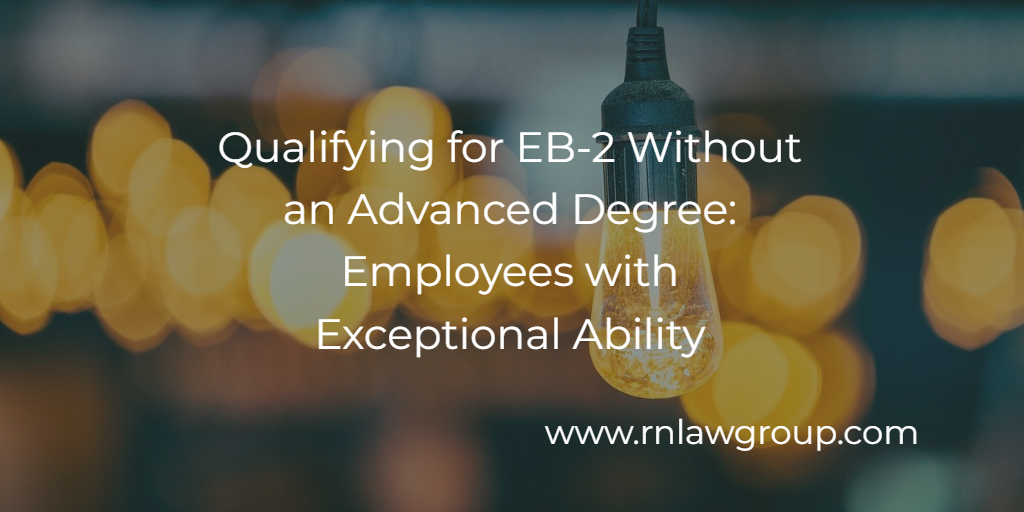
Qualifying for EB-2 Without an Advanced Degree: Employees with Exceptional Ability
There are multiple employment based immigrant visa preference categories that can be used to obtain lawful permanent residence (green card) in the United States through employment. Often however, foreign nationals are sponsored for the Employment Based Second Preference category, commonly known as “EB-2.” Most individuals qualify for the EB-2 category based on a U.S. advanced degree or its foreign equivalent (or a U.S. Bachelor’s degree or its foreign equivalent and 5 years of progressive post-baccalaureate experience).
Foreign nationals who do not meet the advanced degree requirement are frequently sponsored for the Employment Based Third Preference category, commonly known as “EB-3.” Sponsorship in the EB-3 category can mean longer wait times for a green card depending on country of birth. What you may not know is that a foreign national can qualify for the EB-2 category without an advanced degree if they are considered to be an individual of exceptional ability in the sciences, arts, or business.
How to Qualify for EB-2 Exceptional Ability
Exceptional ability is defined as “a degree of expertise significantly above that ordinarily encountered in the science, arts, or business.” A foreign national may qualify for EB-2 without an advanced degree by demonstrating that because of their exceptional ability in the sciences, arts, or business, they will substantially benefit prospectively the national economy, cultural or education interests, or welfare of the U.S., and whose services are sought by an employer in the U.S.
At least 3 of the following criteria must be met in order for a foreign national to prove exceptional ability:
- Official academic record showing that you have a degree, diploma, certificate, or similar award from a college, university, school, or other institution of learning relating to your area of exceptional ability
- Letters documenting at least 10 years of full-time experience in your occupation
- A license to practice your profession or certification for your profession or occupation
- Evidence that you have commanded a salary or other remuneration for services that demonstrates your exceptional ability
- Membership in a professional association
- Recognition for your achievements and significant contributions to your industry or field by your peers, government entities, professional or business organizations
- Comparable evidence may be submitted if the above categories are inapplicable. This evidence may include expert opinion letters.
The U.S. Citizenship and Immigration Services (USCIS) will apply a 2 step approach when analyzing whether a foreign national is an individual of exceptional ability. The USCIS will first determine if the foreign national meets the 3 prong test above, and will then analyze whether the submitted evidence is sufficient to demonstrate a degree of expertise significantly above that ordinarily encountered in a particular field. Therefore, it is not just a matter of “checking-off” 3 of the criteria above. A foreign national will instead need to submit concrete evidence proving a level of expertise significantly greater than others in their field and discuss which element of prospective benefit will be achieved (i.e. national economy, cultural or education interests, or welfare of the U.S).
How to Apply?
To be sponsored for the EB-2 category based on exceptional ability, a foreign national must have a full-time permanent job offer from a U.S. employer and an approved PERM labor certification from the Department of Labor, unless qualifying under the National Interest Waiver (NIW). After the PERM labor certification is approved, the employer will file an I-140 Immigrant Petition with USCIS on behalf of the foreign national, along with all qualifying documentation proving exceptional ability.
Conclusion
Foreign nationals who do not meet the EB-2 advanced degree requirement can still qualify for the EB-2 category if it can be demonstrated that they are an individual of exceptional ability and that their employer has a legitimate need for this level of skill. Careful analysis of your unique case is highly recommended in order to ensure a successful outcome on your case. You should seek advice from a qualified immigration attorney to help determine if this is the best option for you.
By: Krystal Alanis
Krystal Alanis is a Partner at Reddy Neumann Brown PC, Houston’s largest immigration law firm focused solely on U.S. employment-based immigration. She acts as the Managing Attorney for the firm’s PERM Labor Certification Department, where she oversees all EB-2 and EB-3 employment-based green card matters. She also guides employers and individuals through the I-140 and Adjustment of Status process, assists clients with non-immigrant visa petitions (e.g. H-1B, TN, L-1, etc.), and advises her clients on I-9 compliance issues.

